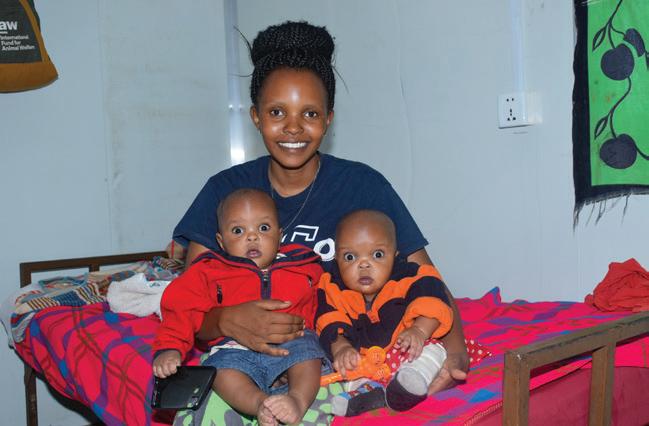
1 minute read
family-friendly ranger station allows women protecting Kenya’s wildlife to bring children to work
Beatrice Nashipae is a 24-year-old mother of six-month-old twins, Matteo and Natalie. She is also a member of Team Lioness, East Africa’s first all-woman community wildlife ranger unit based in Amboseli, in southern Kenya
One thing that has made her experience on Team Lioness even more fulfilling is that Matteo and Natalie stay with her at the community ranger base, where their nanny, Charity, can look after them while Beatrice is out on patrol.
Advertisement
“I always wanted to be a protector of the community,” Beatrice says of her career choice. Of Matteo and Natalie, she says, “They are my life.”
Wildlife security is still a male-dominated career in Amboseli. While many complex factors prevent women from becoming rangers, IFAW is addressing one fundamental problem: the way rangers are separated from their families for weeks at a time.
Rangers spend three weeks a month at wildlife security bases that are not comfortable or safe places for children. In a patriarchal society where women perform the childcare, this separation becomes a huge obstacle for mothers. Some give up their careers when they have babies. Many decide not to join the profession at all.
That’s why IFAW, thanks to support from the Margarete–Brauer Stiftung, renovated the ranger base at Risa, Amboseli, to better meet the needs of young families.
The renovation was completed in June 2022. Each of the 16 Team Lioness rangers now has her own room with a washroom, instead of sharing one with four colleagues, as was the case at the previous building. The rooms give the rangers better opportunities for resting and for mother-child bonding.

Other facilities that make make family life easier include a new laundry area and a crèche, with baby cots, toys, play mats and chairs for caregivers. When Team Lioness rangers go out on patrol, nannies or family members look after their children.
There are currently five children at base, with three more expected. In total, 14 of the 16 Team Lioness members are mothers. Seven of them have children under a year old.
Community wildlife ranger work is physically and mentally challenging. Team Lioness rangers have defied culture by working in a largely male career. IFAW is committed to addressing infrastructure and other obstacles that prevent women from seeing ranger work as a viable career.










